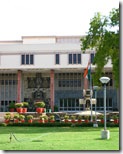
The Delhi High Court has designated Delhi Bar Council Chairman Rakesh Tiku and nine other advocates, including two female lawyers, as senior counsels in a full court room meeting on 27 January.
Advocates Suhel Dutt, Abhinav Vashist, Pradeep Diwan, D S Narula, Suresh Chand Ladi, Anup Kapoor, Jyoti Singh, Prem Lata Bansal and central government’s standing counsel Atul Nanda were also designated to Delhi High Court senior counsel in this round.
Each of the selected advocates won their respective designations after a two-third majority of the Delhi High Court judges voted in their favour in a secret ballot held last month.
One senior counsel who declined to be named told Legally India that the procedure for the selection of senior advocates at the high court level “lacks objectivity” and leaves much to be desired, while the process followed in the Supreme Court by contrast was followed more earnestly.
“It is generally believed in the legal fraternity that the system of processing the request and the procedure for selection of senior counsels is non-objective, seemingly arbitrary and does not leave a clue to the person why he has been designated and why not. There is some kind of secrecy and non-openness because of the secret ballot,” he said.
There have been instances in the past when deserving advocates have been rejected by the Delhi High Court for senior counsel designation, which in turn led them to seek such a position in other high courts, the advocate recalled.
According to him, winning two-third of votes of the judges involves a lot of appeasement which in principle is not allowed. “Academically, no one is supposed to canvass his candidature, but since there’s a secret ballot, you never know who has voted for whom,” he said.
In practice, a senior counsel designation enhances the “brand value” of the concerned advocate, said the advocate, which also may potentially lead to better career prospects in monetary terms.
Section 16 of the Advocates Act 1961 creates two classes of advocates, “senior advocates” and “other advocates”. Those advocates who by virtue of their ability, standing at the Bar or special knowledge of experience in law are thought befitting by the Supreme Court of a High Court get the senior counsel designation.
threads most popular
thread most upvoted
comment newest
first oldest
first
In total Ms Jyoti Singh got us justice in more than 5,000 cases of Bank guarantees and policy cases from the period 1994 to 2004 and we found her very honest, intelligent, diligent and hard worker. She has furnished legal opinion in a number of litigation cases, by which Govt was able to take a decision.
She even entertained our cases, not only during office hours but even on odd hours, as per the nature of court matters.
I also understand that she is an expert on Service matter cases, as court cases from all the three services used to come to her kitty. If some one not having the fee to pay her, she was also extending her help by fighting the cases of poor section of the society on almost fee of cost, saying that "Jab paisa hoga to de dena".
To sum up, the authority has taken right step in upgrading Jyoti Singh's status to Senior Counsel, but she has never shown that she is senior advocate.
I salute her honesty, integrity and continuity to serve the common man of the country through her limited resources.
Thanks,
Sanjeev Kr Sharma
Mobile #: +9899573797
Email:
threads most popular
thread most upvoted
comment newest
first oldest
first